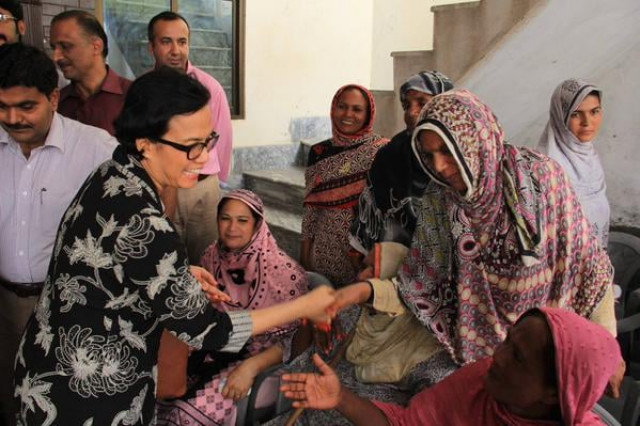Deepen reforms and invest in development: World Bank
Impressed with govt’s success at stabilising economy; wants focus on infrastructure

Sri Mulyani Indrawati meets with BISP beneficiaries in Lahore. PHOTO: WORLD BANK
Pakistan needs to improve governance, prioritise spending and deepen economic reforms, said World Bank Managing Director Sri Mulyani Indrawati on Tuesday, indicating that the country’s largest lender is not fully satisfied with the current pace of reforms and wants a change in priorities.
The managing director also underscored the need to strengthen the capacity of government’s institutions aimed at improving the service delivery in areas of energy, health and education.
While the World Bank highlighted the importance of strengthening capacity of the institutions, the lender has been funding capacity-building programmes for many years, but no concrete results have been achieved so far.
“Sri Mulyani Indrawati underlined the importance of deepening Pakistan’s reforms and investments in priority development areas so that the country could achieve a higher level of economic growth to reduce poverty and increase shared prosperity,” according to a handout issued by the lender’s country office.
The press statement was issued after the conclusion of her three-day visit to Pakistan. She, along with Prime Minister Nawaz Sharif and Finance Minister Ishaq Dar, heard updates on the progress of economic reforms implemented by the government.
The MD’s emphasis on deepening reforms indicated that the Washington-based lender considered the current economic reforms superficial, said an independent expert, well-acquainted with the working of international financial institutions. He also added that no serious reforms had been introduced in the energy sector.
Instead of undertaking administrative and governance reforms in the energy sector, the government’s emphasis has so far been limited to increasing the electricity prices through multiple surcharges.
Due to delay in energy reforms, the World Bank has already withheld approval of $500 million loan for the sector.
The lender has also asked Pakistan to change its priorities and invest in areas where more is required.
“The priorities that we discussed include initiatives to improve people’s everyday lives, such as energy, health, education, and the social safety net, as well as expanding the tax base and strengthening governance and capacity of key institutions to support these services,” stated the handout.
Instead of investing more in the energy sector, the current fiscal year’s federal development spending is heavily focused on transport and communication sector, as almost half of the funding is earmarked for this sector.
The official pointed to the youth bulge as a potential asset for Pakistan’s development, but to benefit from this would require improvements in education and training, including for girls and women.
“Increasing numbers of young people in Pakistan mean job creation is a priority, and this will require improvements in the business and investment climate, privatisation, and tapping the potential of regional integration,” said Indrawati.
In what appears to be a balancing strategy, the World Bank stated that Indrawati was impressed with the government’s success at stabilising the economy under difficult circumstances.
She also appreciated the joint efforts of the federal and provincial governments to expand the Benazir Income Support Programme (BISP) through conditional cash transfers for education outcomes. She also met with Punjab Chief Minister Shahbaz Sharif and learned about provincial-level reform efforts and development projects under implementation and preparation with World Bank Group support.
Indrawati emphasised on the importance of private sector’s contributions towards the development of Pakistan during her visit.
Currently, as many as 25 schemes are financed by the World Bank with a total net commitment of $4.95 billion. The International Finance Corporation, the World Bank Group’s private sector arm, has a committed portfolio of about $1.2 billion in 47 companies, of which infrastructure energy, ports, and transport sectors account for 53%, general manufacturing and services 15% and financial markets 32%.
Published in The Express Tribune, August 5th, 2015.
Like Business on Facebook, follow @TribuneBiz on Twitter to stay informed and join in the conversation.



















COMMENTS
Comments are moderated and generally will be posted if they are on-topic and not abusive.
For more information, please see our Comments FAQ